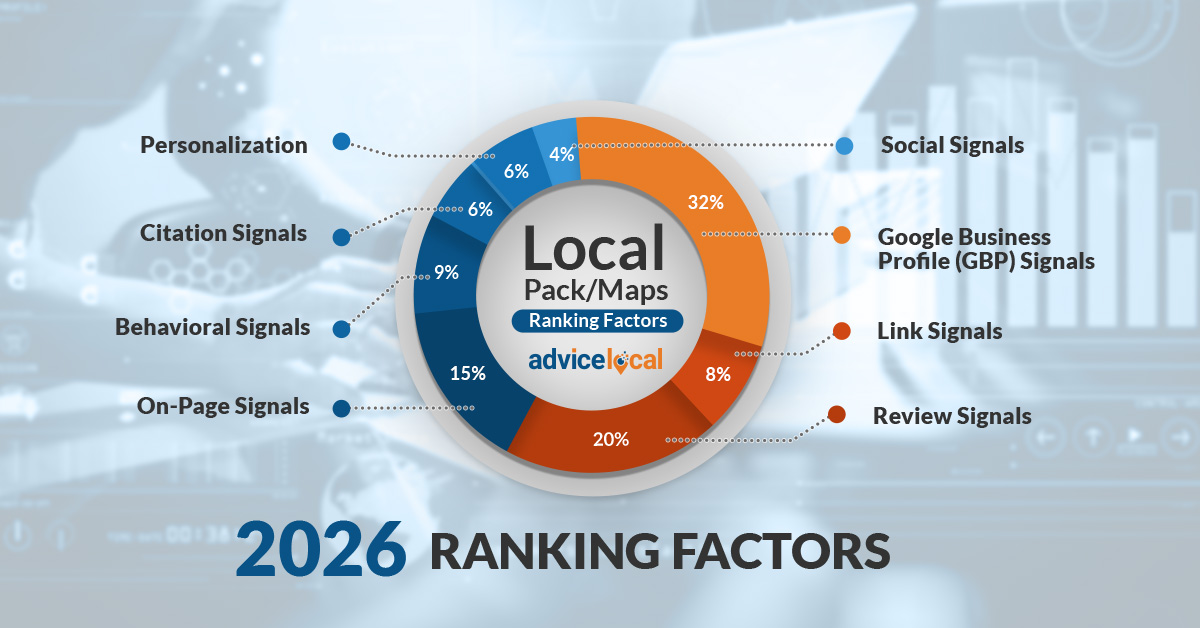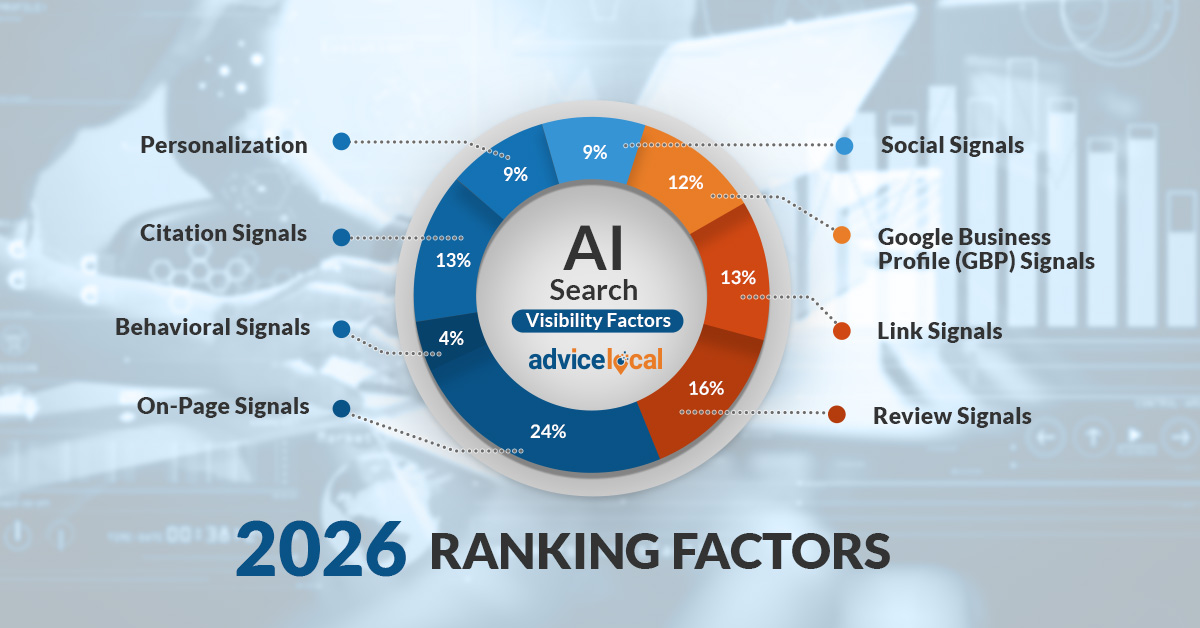Agencies, business partners, local marketers and listings management clients, it’s that time again—we have an updated report of local search ranking factors. Each time this study drops we eagerly anticipate diving into the meat of it to help us understand what other experts expect for the future, and compare their analyses with the results we see from our own work. Let’s examine what is noted as relevant and most important for local search ranking in the rapidly developing age of AI.
The 2026 Local Ranking Factors Survey Housekeeping Details
The most recent iteration of the Local Search Ranking Factors survey posted to Whitespark in November 2025 (the previous posting was in 2023). As you know, this report started up in 2008 with David Mihm, and has been the work of Darren Shaw since 2017. This year’s compilation is based on a thorough survey sent to 47 local search experts reviewing 187 factors across four major areas including the newest category, “AI Search visibility impact.”
These were scored from 0–5 and broken up into the eight groups that were ultimately ranked to understand where agencies and local marketers should focus their optimization efforts across Local Pack/Maps, Local Organic and AI Search. Of course, this is only part of the process. Your input, the elements you see working, matter for the businesses that trust you too, so let’s review the results!
Local Search Ranking Factors by Group
Below are the local search ranking factors for the three main groups. Remember, what you see from your immediate work may vary by industry or even certain categories. This is especially the case for visibility in AI, which according to Shaw has surprisingly smaller impact on local search, as Google search still dominates the field.
Local Pack/Maps Ranking Factors

- Google Business Profile (GBP) Signals – 32%
- Review Signals – 20%
- On-Page Signals – 15%
- Behavioral Signals – 9%
- Link Signals – 8%
- Citation Signals – 6%
- Personalization – 6%
- Social Signals – 4%
Local Organic Ranking Factors

- On-Page Signals – 33%
- Link Signals – 24%
- Behavioral Signals – 10%
- Personalization – 8%
- Google Business Profile (GBP) Signals – 7%
- Citation Signals – 7%
- Review Signals – 6%
- Social Signals – 5%
AI Search Visibility Factors

- On-Page Signals – 24%
- Review Signals – 16%
- Citation Signals – 13%
- Link Signals – 13%
- Google Business Profile (GBP) Signals – 12%
- Personalization – 9%
- Social Signals – 9%
- Behavioral Signals – 4%
As you can see, there’s a bit of a shake-up happening with review, behavioral and citation signals moving the most from 2023’s results. What do these changes mean for agencies and marketers providing local search services, especially considering the evolving role of local citations in AI search visibility?
Preparing for the Impact of Search Ranking Factors in 2026
Now that we have the high-level view established, what does this mean for local search in 2026? Let’s break it down.
Citations Ranked Lower but Remain Foundational
As we’ve discussed quite a bit this year at Advice Local, citations matter, especially if you want businesses to appear in AI Overviews and answer engines. Three of the top five factors for AI are related to citations. Overall within the AI visibility category, citations rank third with 13%, while their ranking is much lower for the Local Pack and Organic results. However, these numbers misrepresent their impact.
Business NAP (name, address, phone number) data remains the foundation of an organization’s ability to be consistently found online. Without accurate citations the location is hard to find on a map, and contact information often conflicts. Make no mistake, businesses lose conversions without good citations and a solid directory placement strategy. Listing management remains part of a good local SEO strategy for 2026.
Google Business Profile Hours Make a Difference
It’s no surprise that when it comes to the Local Pack and Maps, Google Business Profile (GBP) is once again the top ranking factor at 32%. The other two categories rank lower, though still make a significant impact. One of the biggest factors affecting the GBP rankings this year relates to business hours.
First, ensure that brick-and-mortar businesses have up-to-date business hours, as it can really make a difference. This is seen through a factor pointed out originally by SEO Joy Hawkins, and backed up by others in the survey. Businesses open at the time of search are more likely to rank higher. Having accurate hours for physical locations has a prominent effect on showing up. This is a relatively easy win to obtain for businesses.
GBP Category Is Very Important
Concerning the negative factors, it is imperative that the proper business category is marked and that the business is shown as open, not temporarily or permanently closed.
When the demand for services changes for a business based on the time of the year, they may want to change their primary Google business category. For example, an HVAC company may want to list their category as heating contractor during the winter, and air conditioner contractor during the summer months.
Reviews and Recency
Reviews continue to be a silent salesperson of sorts for local businesses. A solid review strategy needs to be enacted for clients to continually receive new feedback. Whether you create this strategy or simply monitor through a dashboard and help clients understand the importance of interacting, this factor cannot be ignored.
Businesses need to have reviews on their websites, their GBP, as well as on trusted review sites to make the most positive impact on rank. Obviously, the more top-star (4-star and above) reviews the better, along with positive comments—but these must be genuine. Even negative reviews (when well-handled by businesses) can have positive effects on the behavior of consumers, which then can improve search rank.
Behavioral Signals
The other big change from previous years is behavioral signals, which refers to the various activities consumers participate in when engaging with businesses online, like click-through rate, time on page and making calls from the page. Consumers are drawn to useful local content, so it’s important to have well-structured information for them to find.
As mentioned above, local search itself is still Google’s game, but content is where ChatGPT and AI Overviews dominate. Making sure businesses have keyword-rich (and not stuffed) locally-relevant content on local pages and GBP is important. A new finding from this year is the inclusion of businesses in “BEST OF” or “TOP LOCAL” listings for their categories.
These expert or local-celeb driven lists make their mark on consumers for engagement and trustworthiness, and they make a significant impact on traditional and AI-search algorithms. Ask the AI agents what they’re looking for, and utilize your local search toolsets to take 2026 by storm.
The 2026 Local #Search Ranking Factors on #Maps, Organic & #AI by @BernieColeman
Click To Tweet
Achieve Local Search Ranking Success in 2026 & Beyond
As always, Advice Local keeps up with the latest in local search, AI and more to help agencies and local marketers stay ahead of this ever-evolving game. From listings management to the new AI Presence Amplifier, our suite of products continues to help our partners’ businesses rank, and now, stay visible in AI search, all from a simple dashboard. To experience this for yourself, request a demo or call (214) 310-1356.
The post The 2026 Local Search Ranking Factors on Maps, Organic & AI appeared first on Advice Local.